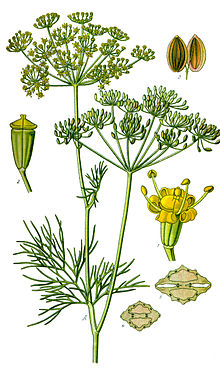dill
English
[edit]Pronunciation
[edit]
Etymology 1
[edit]From Middle English dile, from Old English dile (“dill, anise”); from Proto-Germanic *deliz, of uncertain, probably non-Indo-European origin, possibly a west European substrate.[1]
Cognate with Old Saxon dilli, Dutch dille, Swedish dill, German Dill.
Noun
[edit]dill (countable and uncountable, plural dills)
- Anethum graveolens (the type species of the genus Anethum), a herb, the seeds of which are moderately warming, pungent, and aromatic, formerly used as a soothing medicine for children; also known as dillseed.
- 1940, Rosetta E. Clarkson, Green Enchantments: The Magic Spell of Gardens, The Macmillan Company, page 253:
- The life of one plant would be affected by another. Rue was definitely hostile to basil, rosemary to hyssop, but coriander, dill and chervil lived on the friendliest of terms[.]
- A cucumber pickled with dill flavoring.
- Synonym: dill pickle
Synonyms
[edit]- (herb): anet, dillseed, Peucedanum graveolens
- (type of pickle): dill pickle
Derived terms
[edit]Translations
[edit]
| ||||||||
|
Verb
[edit]dill (third-person singular simple present dills, present participle dilling, simple past and past participle dilled)
- To cook or flavor with dill.
- 2014, Anatoly (Tony) Kandiew, Red Devils, →ISBN, page 139:
- My mother would pickle them and dill them, and we still had an abundance of fresh vegetables left.
See also
[edit]Etymology 2
[edit]Variant of dull
Verb
[edit]dill (third-person singular simple present dills, present participle dilling, simple past and past participle dilled)
- To still; to assuage; to calm; to soothe, as one in pain.
- 1775, Robert Baillie, Letters and Journals: Written by the deceased Mr. Robert Baillie, Principal of the University of Glasgow, page 252:
- The noise of the Queen's voyage to France is dilled down ; no money for her furniture will be got in haste; and the Cardinal has no will of her mother.
- 1829, Publications - Issue 25, Volume 2, page x:
- The innocent was punished. The gear is payed and the thieves dilled down.
- 1829, John Spalding, James Skene, The History of the Troubles and Memorable Transactions in Scotland, page vii:
- The Provincial Assembly sits down. Dr. Guild moderator. Dr. Scroggie preaches. His sermon found faulty. It dills down.
- 1890, Thomas Nield, Oliver Cromwell, Lord Protector of England: A Drama, page 23:
- And there is nought to call them back, while these Curmudgeon generals dill down in their fear.
- 1938, Alexander Ross, Scot. Text S, page 195:
- That now the dinn o' it wad soon dill down, An' but a story at the last be found.
Etymology 3
[edit]Perhaps a backformation from dilly (“silly”).
Noun
[edit]dill (plural dills)
- (Australia, informal) A fool.
- 2016, Robert G. Barrett, And De Fun Don't Done: A Les Norton Novel:
- He could go over and monster his way among the poms, but he was that drunk he'd probably only make a dill of himself.
References
[edit]- “dill”, in OneLook Dictionary Search.
- “dill”, in The Century Dictionary […], New York, N.Y.: The Century Co., 1911, →OCLC.
 dill on Wikipedia.Wikipedia
dill on Wikipedia.Wikipedia  Anethum graveolens on Wikispecies.Wikispecies
Anethum graveolens on Wikispecies.Wikispecies  Anethum graveolens on Wikimedia Commons.Wikimedia Commons
Anethum graveolens on Wikimedia Commons.Wikimedia Commons
- ^ “dill”, in The American Heritage Dictionary of the English Language, 5th edition, Boston, Mass.: Houghton Mifflin Harcourt, 2016, →ISBN.
Icelandic
[edit]Etymology
[edit]From Old Norse dylja, from Proto-Germanic *dilja-, of uncertain, non-Indo-European origin, possibly a substrate.
Pronunciation
[edit]Noun
[edit]dill n (genitive singular dills, no plural)
Declension
[edit]| Declension of dill | ||
|---|---|---|
| n-s | singular | |
| indefinite | definite | |
| nominative | dill | dillið |
| accusative | dill | dillið |
| dative | dilli | dillinu |
| genitive | dills | dillsins |
Swedish
[edit]Etymology
[edit]From Old Swedish dil, from Old Norse dylja, from Proto-Germanic *dilja-, of uncertain, non-Indo-European origin, possibly a substrate.
Pronunciation
[edit]Audio: (file)
Noun
[edit]dill c (uncountable)
- the herb dill
Declension
[edit]| nominative | genitive | ||
|---|---|---|---|
| singular | indefinite | dill | dills |
| definite | dillen | dillens | |
| plural | indefinite | — | — |
| definite | — | — | |
- English 1-syllable words
- English terms with IPA pronunciation
- Rhymes:English/ɪl
- Rhymes:English/ɪl/1 syllable
- English terms with audio pronunciation
- English terms inherited from Middle English
- English terms derived from Middle English
- English terms inherited from Old English
- English terms derived from Old English
- English terms derived from Proto-Germanic
- English terms derived from substrate languages
- English lemmas
- English nouns
- English uncountable nouns
- English countable nouns
- English terms with quotations
- English verbs
- Australian English
- English informal terms
- en:Apieae tribe plants
- en:Herbs
- Icelandic terms inherited from Old Norse
- Icelandic terms derived from Old Norse
- Icelandic terms derived from Proto-Germanic
- Icelandic terms derived from substrate languages
- Icelandic 1-syllable words
- Icelandic terms with IPA pronunciation
- Rhymes:Icelandic/ɪlː
- Rhymes:Icelandic/ɪlː/1 syllable
- Icelandic lemmas
- Icelandic nouns
- Icelandic neuter nouns
- Icelandic uncountable nouns
- is:Celery family plants
- is:Spices and herbs
- Swedish terms inherited from Old Swedish
- Swedish terms derived from Old Swedish
- Swedish terms inherited from Old Norse
- Swedish terms derived from Old Norse
- Swedish terms derived from Proto-Germanic
- Swedish terms derived from substrate languages
- Swedish terms with audio pronunciation
- Swedish lemmas
- Swedish nouns
- Swedish common-gender nouns
- Swedish uncountable nouns
- sv:Herbs
- sv:Apieae tribe plants